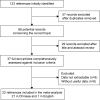Association of carotid atherosclerosis and recurrent cerebral infarction in the Chinese population: a meta-analysis
- PMID: 28260898
- PMCID: PMC5325114
- DOI: 10.2147/NDT.S124386
Association of carotid atherosclerosis and recurrent cerebral infarction in the Chinese population: a meta-analysis
Abstract
Stroke, when poor blood flow to the brain results in cell death, is the third leading cause of disability and mortality worldwide, and appears as an unequal distribution in the global population. The cumulative risk of recurrence varies greatly up to 10 years after the first stroke. Carotid atherosclerosis is a major risk factor for stroke. The aim of this study was to investigate and estimate the relationship between carotid atherosclerosis and risk of stroke recurrence in the Chinese population. We performed a systematic review and meta-analysis of randomized controlled trials published from 2000 to 2013, using the following databases: PubMed, Embase, Medline, Wanfang, and the China National Knowledge Infrastructure. The odds ratios with 95% confidence intervals were calculated to examine this strength. A total of 22 studies, including 3,912 patients, 2,506 first-ever cases, and 1,406 recurrent cases, were pooled in this meta-analysis. Our results showed that the frequency of carotid atherosclerosis is higher in recurrent cases than that in the first-ever controls (78.88% vs 59.38%), and the statistical analysis demonstrated significant positive association between carotid atherosclerosis and recurrent cerebral infarction (odds ratio: 2.87; 95% confidence interval: 2.42-3.37; P<0.00001) in a fixed-effect model. No significant heterogeneity was observed across all studies. In conclusion, our results showed that carotid atherosclerosis was associated with increased risk of recurrent stroke. However, further well-designed research with large sample sizes is still needed to identify the clear mechanism.
Keywords: carotid atherosclerosis; cerebral infarction; meta-analysis.
Conflict of interest statement
Disclosure The authors report no conflicts of interest in this work.
Figures



References
-
- Mozaffarian D, Benjamin EJ, Go AS, et al. Heart disease and stroke statistics-2016 update: a report from the American Heart Association. Circulation. 2016;133(4):e38–e360. - PubMed
-
- Vickrey BG, Rector TS, Wickstrom SL, et al. Occurrence of secondary ischemic events among persons with atherosclerotic vascular disease. Stroke. 2002;33(4):901–906. - PubMed
-
- Krishnamurthi RV, Moran AE, Feigin VL, et al. Stroke prevalence, mortality and disability-adjusted life years in adults aged 20–64 years in 1990–2013: data from the Global Burden of Disease 2013 Study. Neuroepidemiology. 2015;45(3):190–202. - PubMed
LinkOut - more resources
Full Text Sources
Other Literature Sources

